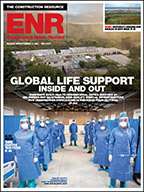Buoyed by the progress of its performance-based Living Building Challenge green-building certification program, the International Living Future Institute is casting a net beyond the LBC. ILFI, through the umbrella Living Future Challenge announced recently, says it is developing even more ways to rethink "the way humanity designs its systems, products, buildings and communities."
"It's the Living Future Institute, not the Living Building Institute, because it's not just about buildings," said Jason McLennan, ILFI's CEO. "The Living Future Challenge is a framework for remaking everything."
Toward that goal, ILFI introduced the third version of the LBC and the first version of the Living Community Challenge (LCC) at the Living Future 14 conference, held May 21-23 in Portland, Ore. LBC is a demanding program for the production and operation of self-sustaining buildings, with a goal—among many—of net-zero annual energy use.
Version 3 "continues to push the bar forward while making the experience less challenging where it can be," said McLennan. "There is a greater emphasis on resilience—places of shelter and refuge."
LCC is designed to help planners and developers rethink community-scale projects. It will provide certification at both the master planning and build-out stages.
The group also announced a plan to start the Living Product Challenge later this year. The goal is to change the design and manufacture of all types of products—not only building-related ones—to reduce negative environmental impact.
Both the communities and products programs were initially part of the LBC. For example, through its Red List, the LBC already restricts the specification of products that contain ingredients deemed harmful to the environment and people.
Ingredient disclosure, called transparency, is contentious. Suppliers are concerned about revealing trade secrets. With the upcoming Living Product Challenge, McLennan hopes to "get beyond the distrust" between ILFI and suppliers. As far as green materials and products goes, "we are still in the Wild West," he said. "It's time for more clarity around materials and products."
Beyond that, ILFI is developing programs for living food, living enterprises and living lifestyles. In parallel, the International Well Building Institute, separate from but collaborating with the ILFI, recently kicked off scientific peer review for the WELL Building Standard and announced that the Green Building Certification Institute will provide third-party certification. GBCI also certifies LEED buildings for the U.S. Green Building Council's rating system.
The performance-based WELL standard is a system for measuring, certifying and monitoring features that have an impact on human health and well-being, including air, water, nourishment, light, fitness and comfort, according to the WELL group, which is a for-profit Benefit Corporation. B Corps, certified by the nonprofit B Lab, meet rigorous standards of environmental performance.










